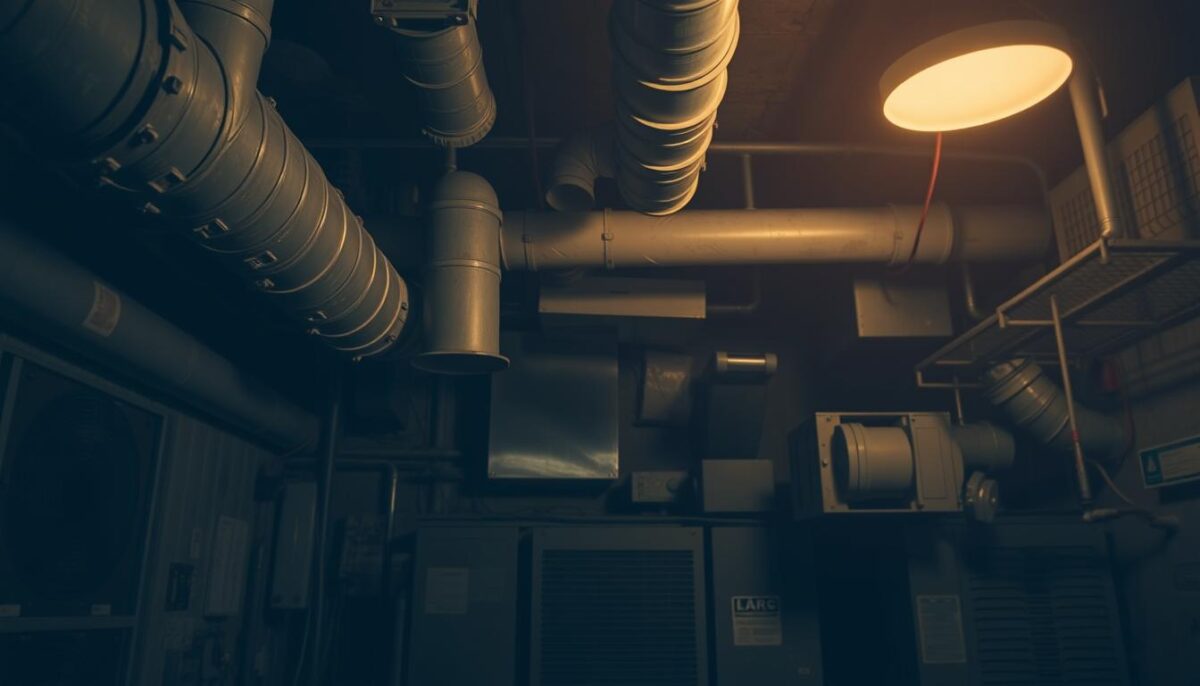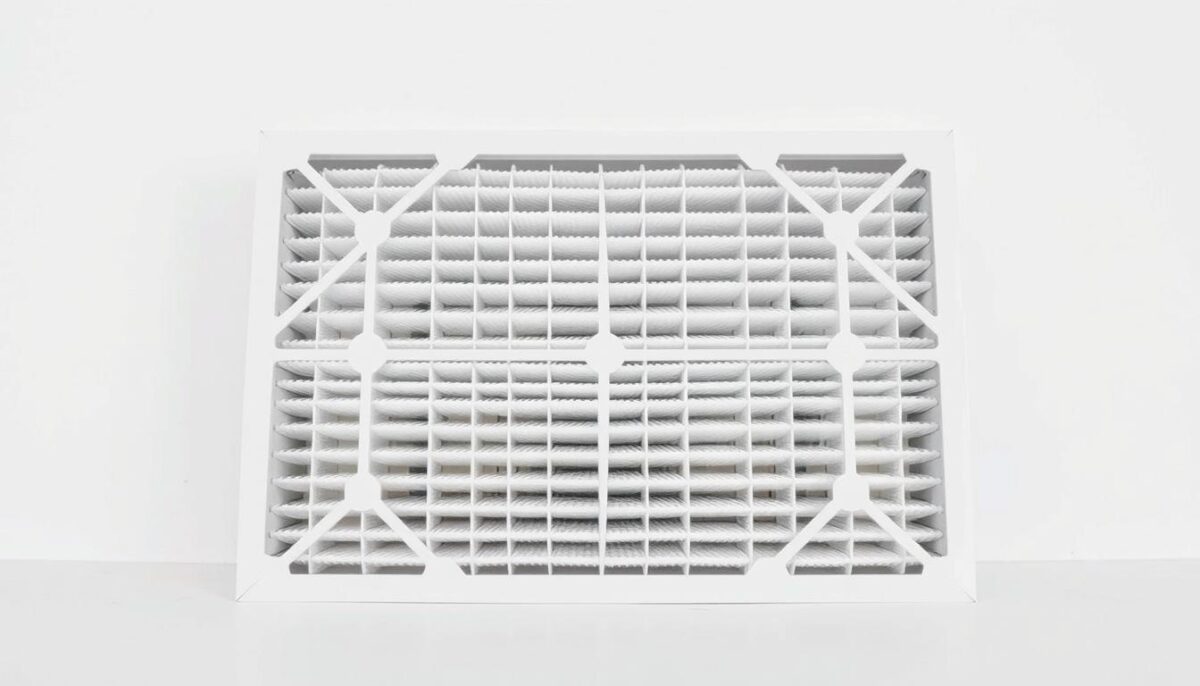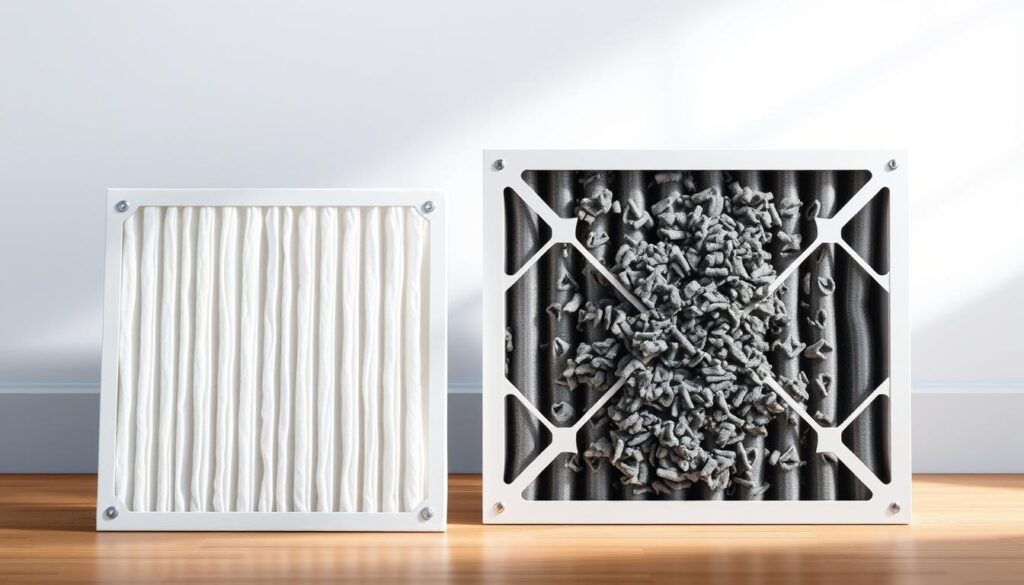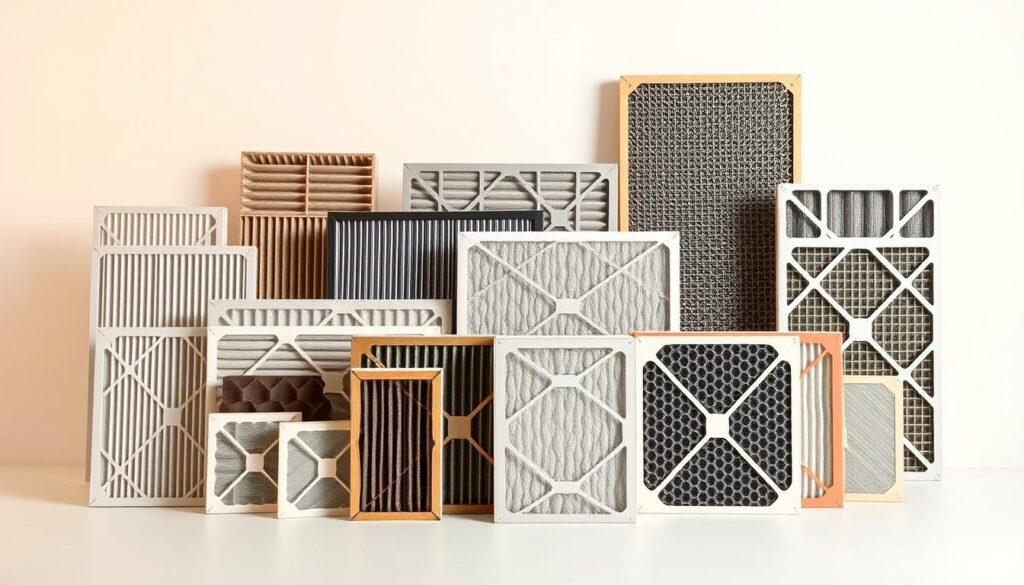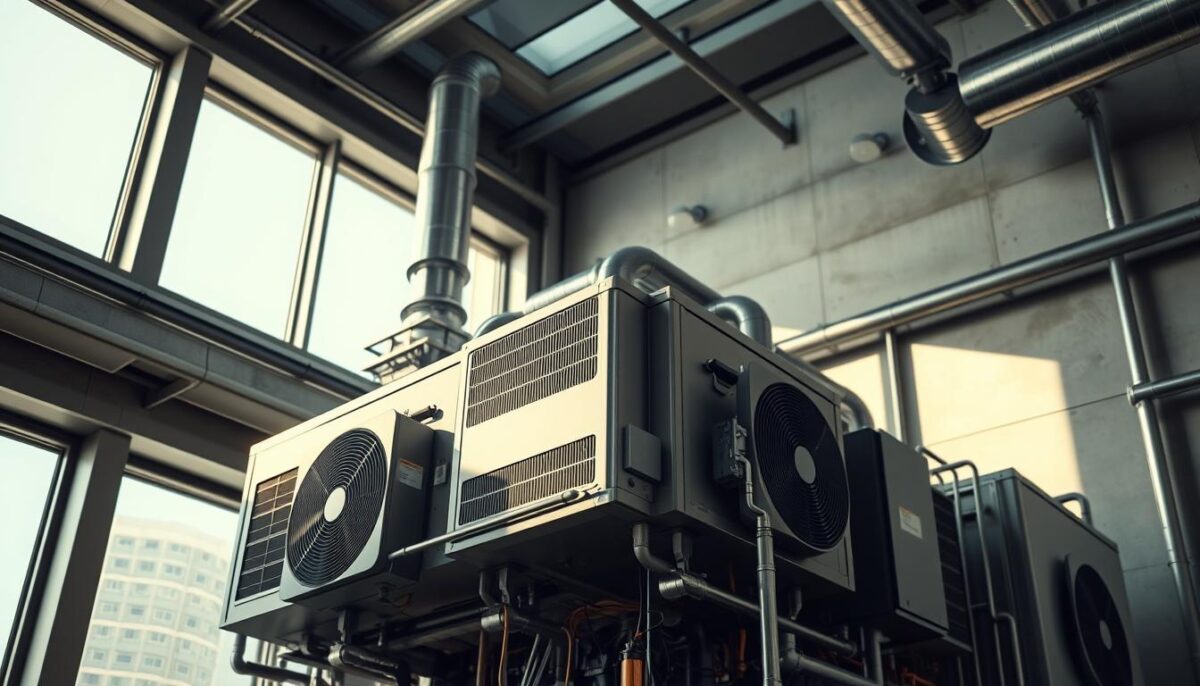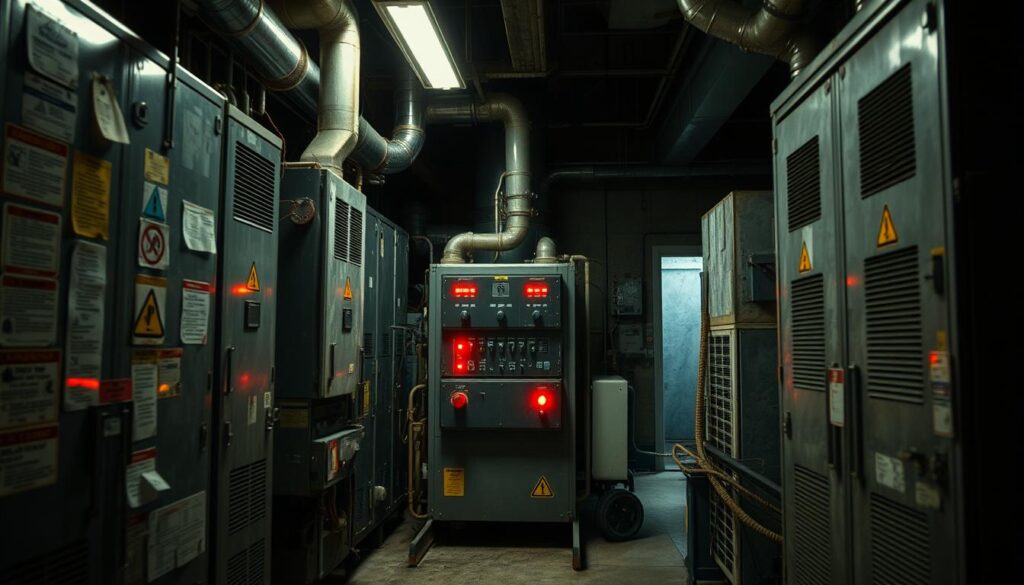Noisy HVAC System? What Those Sounds Might Be Telling You
Your home’s HVAC system is supposed to operate relatively quietly, with only minimal background noise that you barely notice during normal operation.
However, when it starts making unusual or loud noises, it’s often a warning sign that something isn’t working correctly and requires attention.
Different sounds indicate different problems – from minor issues that you might be able to fix yourself to serious malfunctions that require professional intervention.
Understanding what these noises mean can help you address potential issues before they become major problems, saving you money on AC repairs and extending the life of your system.
Key Takeaways
- Unusual noises from your HVAC system can indicate potential issues.
- Understanding these sounds can help you address problems early.
- Different sounds indicate different problems.
- Some issues can be fixed yourself, while others require professional help.
- Identifying and addressing issues early can save you money on repairs.
Understanding Your HVAC System and Its Normal Sounds

Understanding the normal sounds of your HVAC system can help you detect unusual noises that may indicate a problem. To do this, you first need to familiarize yourself with the basic components of your system and the sounds it typically makes during operation.
Key Components of a Residential HVAC System
A residential HVAC system consists of several key components, including the furnace or air conditioner, compressor, fan motor, and ductwork. Each of these parts plays a crucial role in heating or cooling your home. The components work together to circulate air and regulate temperature.
| Component | Function |
|---|---|
| Furnace/Air Conditioner | Heats or cools the air |
| Compressor | Compresses refrigerant to cool air |
| Fan Motor | Circulates air through the system |
| Ductwork | Distributes heated or cooled air throughout the home |
What Constitutes “Normal” HVAC Noise
Even well-functioning HVAC systems produce some level of noise. Normal sounds include a gentle humming when the system starts, soft whooshing of air through vents, and occasional clicking when it turns on or off. Becoming familiar with these sounds helps you identify when something unusual occurs.
Common Noisy HVAC System Sounds and Their Meanings
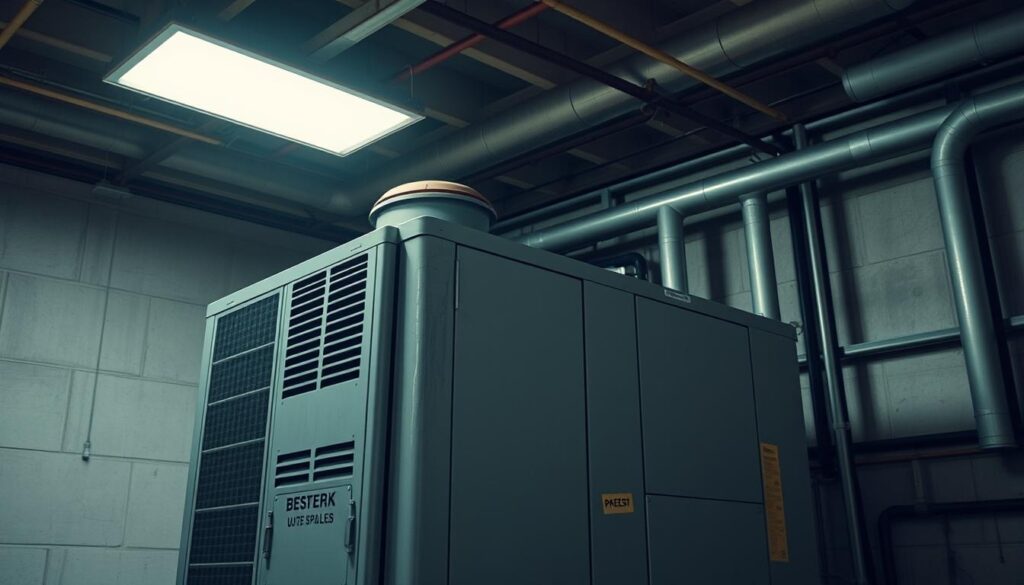
Identifying the specific noises your HVAC system is making is the first step in diagnosing and addressing potential issues. Different sounds can indicate various problems, ranging from minor maintenance needs to serious system failures.
Squealing or Screeching Noises
Squealing or screeching noises from your HVAC system often point to issues with the belt or motor. A worn-out or misaligned belt can cause these high-pitched sounds. It’s essential to address these noises promptly to prevent further damage to your system.
Banging, Clanking, or Rattling Sounds
Banging, clanking, or rattling sounds typically indicate loose or broken parts within your HVAC system. These could be loose screws, debris in the ductwork, or a malfunctioning blower wheel. Inspecting and tightening loose parts or removing debris can often resolve these issues.
Hissing or Whistling Noises
Hissing or whistling noises usually suggest issues related to airflow or refrigerant leaks. A hissing sound might indicate a leak in the refrigerant lines or a problem with the system’s ductwork. Whistling noises often result from high-velocity air escaping through gaps or leaks in the ducts.
Buzzing or Humming Sounds
Buzzing or humming sounds often indicate electrical problems within your HVAC system’s components. These noises can originate from the compressor, transformer, or relay switches when they’re not functioning properly. A buzzing sound might signal that the compressor is struggling to start due to electrical issues or is nearing the end of its useful life. Loose electrical connections can create persistent humming that may grow louder over time. In some cases, buzzing might be caused by vibrating ductwork or loose panels that resonate when the system operates. Electrical buzzing sounds should be addressed promptly as they can indicate issues that might lead to system failure or even electrical hazards.
- Electrical issues are a common cause of buzzing or humming noises in HVAC systems.
- Components such as the compressor, transformer, and relay switches are often the source of these sounds when malfunctioning.
- Loose electrical connections can lead to persistent humming that worsens over time.
- Vibrating ductwork or loose panels can also cause buzzing noises.
Troubling Sounds That Require Immediate Attention
Certain noises from your HVAC system are red flags, indicating potential problems that could lead to significant damage if ignored. While some sounds might be harmless, others signal serious issues that require prompt professional attention.
Understanding the nature of these noises is crucial for diagnosing and addressing the underlying causes before they escalate into major problems.
High-Pitched Screaming from Your AC Unit
A high-pitched screaming noise from your air conditioning unit can be alarming. This sound often indicates a serious issue, such as a malfunctioning compressor or a failing fan motor. If you hear such a noise, it’s advisable to turn off your AC unit to prevent further damage and consult a professional technician.
Loud Booming from Your Furnace
A loud booming noise from your furnace can be startling and is typically a sign of an ignition issue. This could be due to a problem with the igniter or the gas valve. Ignition issues can lead to safety hazards, including the risk of gas leaks or explosions. Therefore, a booming furnace noise warrants immediate investigation by a qualified HVAC technician.
Persistent Clicking or Grinding Noises
Clicking or grinding noises from your HVAC system can indicate a range of issues. If the clicking is coming from the AC unit, it might be related to the outside compressor or the inside air handler. For furnaces, persistent clicking could signal a problem with the ignition system. Grinding noises, on the other hand, almost always indicate serious mechanical problems, such as worn-down motors or bearings.
| Noise Type | Possible Cause | Recommended Action |
|---|---|---|
| High-Pitched Screaming | Malfunctioning compressor or fan motor | Turn off the unit and consult a technician |
| Loud Booming | Ignition issue or gas valve problem | Contact a qualified HVAC technician immediately |
| Clicking or Grinding | Electrical or mechanical issues | Schedule a professional diagnosis |
Addressing these noises promptly is crucial to prevent minor issues from becoming major air conditioning repairs. Regular maintenance and inspections can also help identify potential problems before they manifest as disturbing noises.
What’s Causing Your HVAC System to Make Noise?
The causes of a noisy HVAC system can vary widely, from mechanical problems to airflow issues. Understanding the root cause is essential for effective troubleshooting and resolving the problem.
Mechanical Issues: Loose or Broken Parts
Mechanical issues are a common cause of noise in HVAC systems. Loose or broken parts can create a variety of sounds, from rattling and clanking to squealing and screeching. For instance, a loose belt or a malfunctioning fan motor can produce distinct noises that signal a problem.
Airflow Problems: Blockages and Restrictions
Airflow problems can also lead to unusual noises. Blockages or restrictions in the ductwork or air filters can cause the system to work harder, resulting in increased noise levels. Common issues include dirty air filters, closed dampers, or debris obstructing airflow.
Age-Related Wear and Tear
As HVAC systems age, they naturally develop more noise due to wear and tear on components. Bearings in motors and fans wear down, capacitors become less effective, and heat exchangers can develop cracks. These age-related issues can lead to a range of noises, from humming and grinding to popping and banging. Regular maintenance can help mitigate some of these issues, but in many cases, they signal that the system is approaching the end of its service life.
DIY Solutions for Minor HVAC Noises
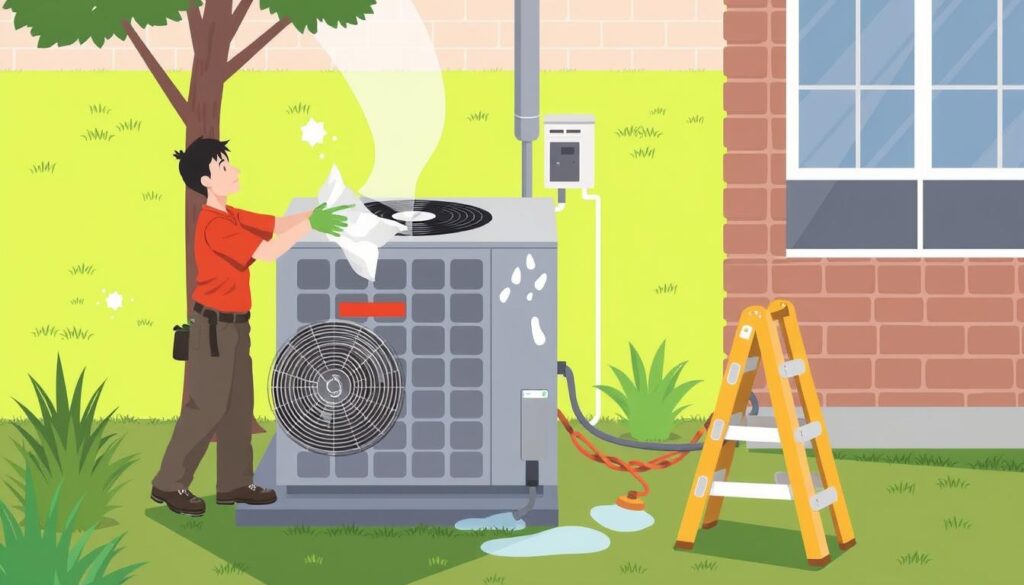
Addressing minor HVAC noises promptly can prevent more significant problems from developing, and there are several DIY solutions you can try first. Before calling a professional, it’s worth exploring these simple fixes to potentially save time and money.
Cleaning or Replacing Air Filters
A dirty or clogged air filter can cause your HVAC system to work harder, leading to increased noise. Regularly cleaning or replacing the air filter can help reduce noise and improve efficiency. Ensure you check your filter monthly and replace it as recommended by the manufacturer.
Securing Loose Panels and Ductwork
Loose panels or ductwork can cause rattling or clanking noises. Inspect your ductwork and panels to ensure they are securely fastened. Tightening any loose parts can help minimize these noises and prevent further damage to your system.
Clearing Debris Around Outdoor Units
Outdoor condenser units can collect debris like leaves, twigs, and grass clippings, which can interfere with proper operation and create unusual noises. To clear debris:
- Maintain at least two feet of clear space around all sides of your outdoor unit.
- Gently clean the exterior fins with a soft brush or vacuum attachment.
- Remove any vegetation growing too close to the unit.
- Check for and remove any objects that may have fallen into the top grill of the unit.
After clearing debris, listen for any remaining unusual sounds that might indicate internal issues requiring professional attention.
Professional Solutions for Reducing HVAC Noise
To tackle stubborn HVAC noise, professional solutions offer a range of effective treatments. When DIY methods fall short, experts can diagnose and address the root causes of the noise, ensuring a quieter and more comfortable home environment.
Professional HVAC noise reduction services begin with a thorough assessment to identify the source of the noise. This might involve inspecting the system’s ductwork, components, and overall setup to pinpoint where the noise is coming from and what can be done to mitigate it.
Duct Modifications and Soundproofing
One effective approach to reducing HVAC noise is through duct modifications and soundproofing. This can involve modifying duct layouts to reduce turbulence and noise generation or adding soundproofing materials to ducts and surrounding areas to absorb sound. For more information on soundproofing HVAC systems, you can visit our detailed guide on how to soundproof HVAC systems similar to a recording studio would to keep the audio trapped in a room.
Component Upgrades and Replacements
Sometimes, the solution lies in upgrading or replacing noisy components. This could mean swapping out old or faulty parts for newer, quieter models. For instance, replacing an outdated compressor with a newer one can significantly reduce noise. Component upgrades not only help in noise reduction but can also improve the overall efficiency of the HVAC system.
Compressor Sound Blankets and Vibration Pads
A specific solution for reducing noise from the compressor involves using compressor sound blankets. These are specialized acoustic wraps designed to absorb noise from the compressor, which is often the loudest component of an air conditioning system. Additionally, vibration isolation pads can be used under equipment to prevent the transfer of mechanical vibrations to the home’s structure, further reducing noise.
By implementing these professional solutions, homeowners can enjoy a significantly quieter HVAC system. These methods not only reduce noise but also contribute to a more efficient and longer-lasting HVAC system.
When to Call an HVAC Technician
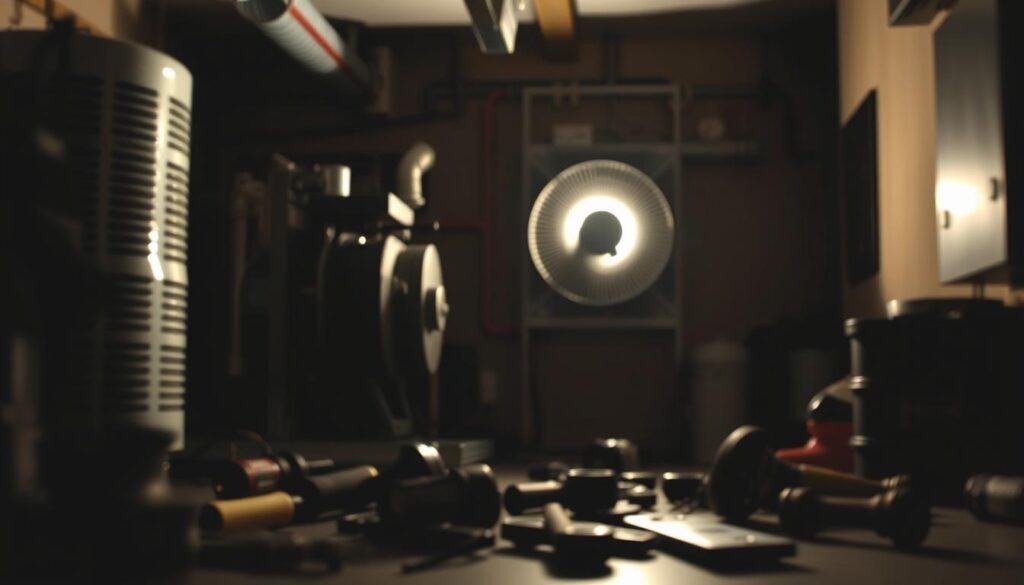
Knowing when to call an HVAC technician can save you time and money by addressing potential issues before they escalate. Your HVAC system is a complex piece of equipment that requires professional attention when it starts making unusual noises.
Signs of Serious System Problems
Certain noises from your HVAC system can indicate serious problems that require immediate attention. For instance, a high-pitched screaming from your AC unit or a loud booming from your furnace are signs of potential mechanical failures or other critical issues.
Other signs include persistent clicking or grinding noises, which can indicate worn-out or damaged parts. If you notice any of these symptoms, it’s crucial to call an HVAC technician promptly to prevent further damage.
What to Expect During a Professional Diagnosis
When you call an HVAC technician for a noise issue, you can expect a systematic diagnostic approach. The technician will first listen to the noise while the system operates and ask detailed questions about when it occurs and how long it’s been happening.
- A comprehensive inspection will include checking electrical components with specialized testing equipment to identify any voltage or amperage abnormalities.
- The technician will inspect mechanical components for wear, damage, or improper operation that might be causing the unusual sounds.
- For refrigerant-based systems, pressure tests may be conducted to ensure proper levels and identify potential leaks.
- After diagnosis, you should receive a clear explanation of the problem, recommended solutions, associated costs, and the consequences of delaying repairs.
- Professional technicians can often detect and address developing issues that aren’t yet creating noticeable symptoms, preventing future breakdowns.
By understanding when to call an HVAC technician and what to expect during a professional diagnosis, you can ensure your system is running efficiently and effectively, minimizing the risk of unexpected failures and costly air conditioner repairs.
Preventative Maintenance to Keep Your HVAC System Quiet
Regular preventative maintenance is vital for keeping your HVAC system running smoothly and quietly. Your HVAC system is crucial for maintaining comfort in your home, especially during extreme temperatures.
To ensure quiet and efficient operation, annual professional maintenance is recommended. This should include inspection and cleaning of all components, tightening of electrical connections, and lubrication of moving parts. Scheduling maintenance in spring for air conditioning systems and fall for furnace systems ensures your equipment is ready for peak usage seasons.
Homeowners can complement professional maintenance by checking and replacing air filters monthly, keeping outdoor units clear of debris, and listening for changes in the system’s normal operating sounds. Proper refrigerant levels are also essential for quiet operation, as both overcharged and undercharged systems can create distinctive noises.
Investing in preventative maintenance typically costs less than emergency repairs and extends the lifespan of your HVAC equipment. By following these guidelines, you can enjoy a quieter, more efficient HVAC system that provides comfort throughout the year.

